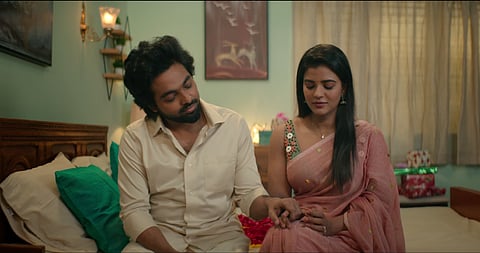DeAr review: GV Prakash’s relationship drama is light-hearted but has little depth
DeAr (Tamil)(3 / 5)
What happens when an extremely light sleeper and loud snorer get married? And how would it affect their lives when this does not come to light until the wedding night? This forms the plot of GV Prakash and Aishwarya Rajesh’s DeAr. Written and directed by Anand Ravichandran, the film is light-hearted and warm, albeit a little superficial.
DeAr, a portmanteau of Deepika (a wonderful Aishwarya Rajesh) and Arjun (GV Prakash), takes an age-old problem and treats it refreshingly. The popular Tamil saying ‘aayiram poi solli oru kalyanam pannalam’ (you can say a thousand lies to conduct a marriage) has been overdone in Kollywood and DeAr almost falls into this category. However, the film is saved by the more realistic portrayals of familial ties, how small issues can break or make marriages, and reconciliation.
The plot follows the life of Arjun, a TV journalist and the younger son of a single mother household where the older brother Saravanan (Kaali Venkat) runs a tight ship. Saravanan and his mother Lakshmi (Rohini) decide that it is time for Arjun to get married and they travel to Ooty to meet Deepika and her family. The duo instantly like each other but Deepika is not upfront about her snoring problem like she was with other potential suitors, upon the advice of her mother.
The happy couple get married and soon all hell breaks loose. Deepika and Arjun come up with inventive ways to work through their problem but things get messy when the latter loses a massive opportunity at work due to his sleeplessness. The rest of DeAr revolves around the couple and their families to see if they are able to resolve their rather uncommon snag.
GV Prakash as Arjun is an improvement from his previous characters in older movies. However, his acting does feel forced and unnatural in places, especially while portraying more intense emotions like anger and grief. However, the chemistry between him and Aishwarya flows naturally and is a pleasure to watch. Their silly tiffs and the eventual patching up in the initial days of marriage are believable and funny.
Meanwhile, Aishwarya nails the role of Deepika almost effortlessly. She is spirited, emotional, and not ready to go down without a fight. Whether it is trying to convince Arjun to see a psychiatrist over his sleeping problem or standing up for herself even when experiencing inner turmoil, Aishwarya is a pleasure to watch on screen.
One of the biggest strengths of the film is how rooted in reality the familial relationships and conflicts are. Arjun’s family is dysfunctional and DeAr does not shy away from showing it in all its ugliness. The film also looks at why Saravanan is controlling and makes decisions on behalf of the entire family and why Arjun is a light sleeper. However, these aspects are dealt in a superficial manner over a conversation and the film could have benefitted from a more in-depth exploration.
The wacky background music – composed by GV Prakash himself – especially when Arjun realises that his wife is a heavy snorer and when his friends make fun of his quirks adds to the film’s wittiness. The humour, even when it borders on sexual innuendo, is not crass and garners laughs from the audience.
The women characters in the film do come off as slightly disappointing. While Deepika, Lakshmi, and Kalpana, Saravanan’s wife, have minds of their own, they are shown to be tolerant of petulant behaviour from their male counterparts. The film tries to score progressive brownie points but ends up contradicting itself. For instance, there is an emotionally charged scene where Lakshmi calls out Saravanan’s controlling behaviour and questions whether he knows anything about Kalpana and her writing aspirations. Two scenes later, after a tearful apology from Saravanan, Kalpana happily tells the family how her husband is now “letting her” publish her short stories.
Similarly, for a movie that takes an excellent stance on women’s bodily autonomy and shows househusbands in a positive light (probably a first in Tamil cinema), there is also a drunk Arjun singing a song deriding wives and women (an age old tradition in Tamil cinema). There were also a few unnecessary digs taken at feminism and feminist women that added little value to the plot.
Despite little nuance and a rushed and easy resolution to a problem that plagued the young couple, DeAr is a fun watch and deserves praise for positive portrayals of several subjects that Tamil cinema has failed at earlier.
Disclaimer: This review was not paid for or commissioned by anyone associated with the film. Neither TNM nor any of its reviewers have any sort of business relationship with the producers or any other members of its cast and crew.

